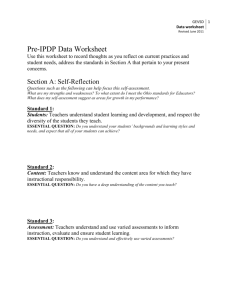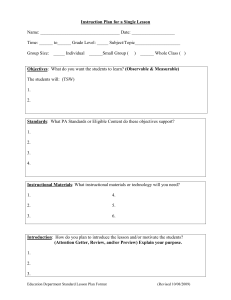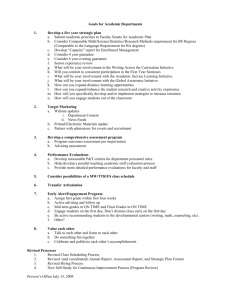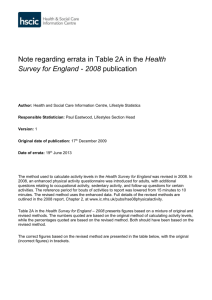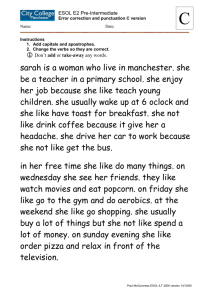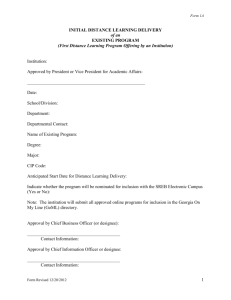Speaking
advertisement
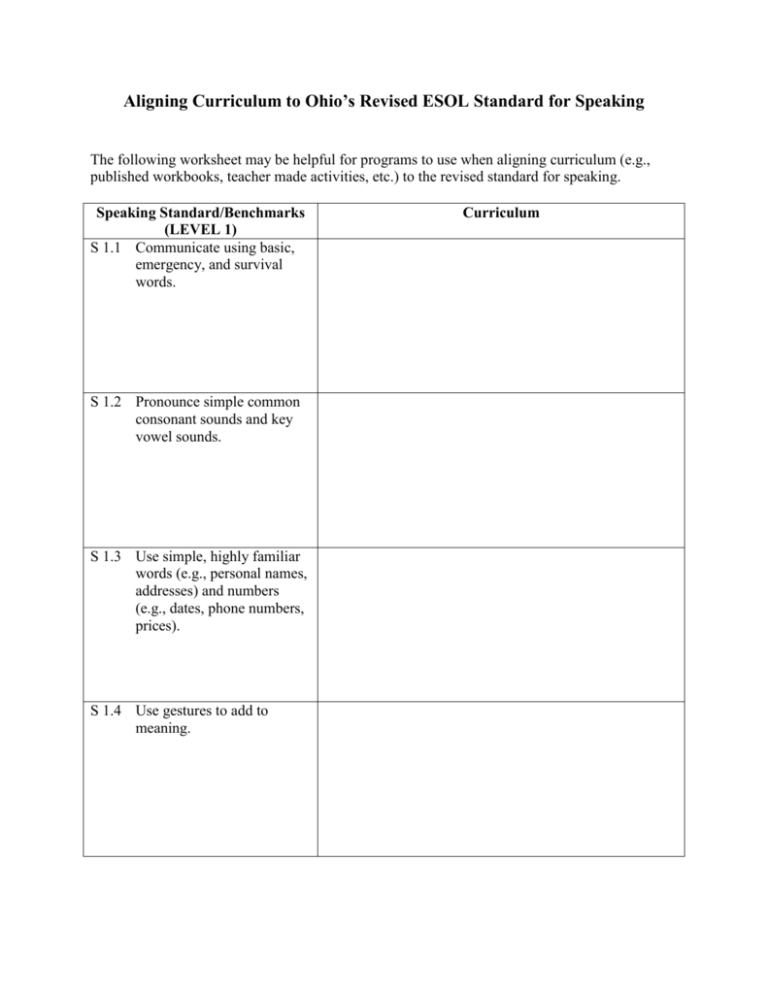
Aligning Curriculum to Ohio’s Revised ESOL Standard for Speaking The following worksheet may be helpful for programs to use when aligning curriculum (e.g., published workbooks, teacher made activities, etc.) to the revised standard for speaking. Speaking Standard/Benchmarks (LEVEL 1) S 1.1 Communicate using basic, emergency, and survival words. S 1.2 Pronounce simple common consonant sounds and key vowel sounds. S 1.3 Use simple, highly familiar words (e.g., personal names, addresses) and numbers (e.g., dates, phone numbers, prices). S 1.4 Use gestures to add to meaning. Curriculum Aligning Curriculum to Ohio’s Revised ESOL Standard for Speaking The following worksheet may be helpful for programs to use when aligning curriculum (e.g., published workbooks, teacher made activities, etc.) to the revised standard for speaking. Speaking Standard/Benchmarks (LEVEL 2) S 2.1 Communicate using simple phrases and sentences with familiar vocabulary, including memorized phrases. S 2.2 Pronounce common consonant and vowel sounds. S 2.3 Use grammatical structures (e.g., verb “to be” and subject pronouns in present tense) to communicate meaning. S 2.4 Use words necessary for daily life (e.g., food, basic body parts, American holidays, family). S 2.5 Use one-to two-word questions (e.g., “Apple?” “Where?”), learned questions, and repetition to ensure listeners understand. Curriculum Aligning Curriculum to Ohio’s Revised ESOL Standard for Speaking The following worksheet may be helpful for programs to use when aligning curriculum (e.g., published workbooks, teacher made activities, etc.) to the revised standard for speaking. Speaking Standard/Benchmarks (LEVEL 3) S 3.1 Communicate using sentences on simple topics (e.g., needs, wants). S 3.2 Pronounce long and short vowels, blends, and diphthongs. S 3.3 Use grammatical structures (e.g., present tense, progressive tense, simple regular past tense) to communicate meaning. S 3.4 Use an increasing vocabulary for everyday situations (e.g., health, housing, banking, school). S 3.5 Use rephrasing to enhance communication. Curriculum Aligning Curriculum to Ohio’s Revised ESOL Standard for Speaking The following worksheet may be helpful for programs to use when aligning curriculum (e.g., published workbooks, teacher made activities, etc.) to the revised standard for speaking. Speaking Standard/Benchmarks (LEVEL 4) S 4.1 Participate in conversations on familiar topics. S 4.2 Communicate meaning by using common contractions (e.g., “can’t,” “won’t”) and stressed syllables in a word (e.g., “beau-ti-ful”). S 4.3 Use grammatical structures (e.g., future and common irregular past tenses) to communicate meaning. S 4.4 Use descriptive words (e.g., commonly-used adjectives, commonly-used adverbs). S 4.5 Repeat, rephrase, or use circumlocution to ensure listeners understand. Curriculum Aligning Curriculum to Ohio’s Revised ESOL Standard for Speaking The following worksheet may be helpful for programs to use when aligning curriculum (e.g., published workbooks, teacher made activities, etc.) to the revised standard for speaking. Speaking Standard/Benchmarks (LEVEL 5) S 5.1 Communicate in a variety of contexts related to daily life and work. S 5.2 Begin to communicate meaning by using linking and intonation. S 5.3 Show some control over basic grammatical structures (e.g., modal verbs, present perfect tenses, and gerunds). S 5.4 Expand vocabulary appropriate for a variety of familiar contexts. S 5.5 Adapt word choice, word stress, and/or grammar to enhance communication. Curriculum Aligning Curriculum to Ohio’s Revised ESOL Standard for Speaking The following worksheet may be helpful for programs to use when aligning curriculum (e.g., published workbooks, teacher made activities, etc.) to the revised standard for speaking. Speaking Standard/Benchmarks (LEVEL 6) S 6.1 Communicate in social and work settings (e.g., opinions, complaints, problems) differentiating between formal and informal. S 6.2 Communicate meaning by using rhythm and stress patterns in sentences, and begin using appropriate pauses. S 6.3 Show control of most grammatical structures (e.g., perfect tenses, conditionals). S 6.4 Demonstrate basic fluency (e.g., register, word choice, gesture, pace). S 6.5 Use a variety of strategies to clarify meaning. Curriculum
